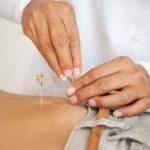Acupuncture can potentially be beneficial for fertility, though its effectiveness can vary based on individual circumstances. Here’s an overview of how acupuncture may support fertility and what the research says:
How Acupuncture May Aid Fertility:
- Hormonal Balance:
- Regulation of Hormones: Acupuncture can help balance hormones, which is crucial for regular ovulation and menstrual cycles.
- Stress Hormones: Reducing stress hormones like cortisol can positively influence reproductive hormone levels.
- Improving Blood Flow:
- Uterine and Ovarian Blood Flow: Acupuncture may improve blood flow to the ovaries and uterus, creating a more favorable environment for egg development and implantation.
- Endometrial Thickness:
- Enhancing Uterine Lining: Better blood circulation can lead to a thicker, healthier uterine lining, which is important for embryo implantation.
- Reducing Stress:
- Lowering Stress Levels: Acupuncture promotes relaxation and reduces stress, which can positively affect fertility since stress can negatively impact reproductive function.
- Supporting Assisted Reproductive Techniques (ART):
- Complementing IVF/IUI: Some studies suggest that acupuncture can improve the success rates of ART procedures like in vitro fertilization (IVF) and intrauterine insemination (IUI).
Research on Acupuncture and Fertility:
- Studies on IVF Outcomes:
- Several studies have investigated the effect of acupuncture on IVF outcomes, with mixed results. Some research suggests that acupuncture performed on the day of embryo transfer may improve pregnancy rates, while other studies have found no significant effect.
- Systematic Reviews and Meta-Analyses:
- A systematic review and meta-analysis published in the journal Fertility and Sterility indicated that acupuncture might improve the outcomes of IVF when performed around the time of embryo transfer, although the quality of evidence varies.
- Mechanisms of Action:
- The precise mechanisms by which acupuncture may enhance fertility are not fully understood, but theories include the regulation of neuroendocrine function, modulation of immune responses, and improved blood flow to reproductive organs.
Considerations:
- Individual Variation: The effectiveness of acupuncture for fertility can vary greatly among individuals. Factors such as the underlying cause of infertility, the skill of the acupuncturist, and the specific acupuncture protocol used can influence outcomes.
- Complementary Approach: Acupuncture is often used as a complementary therapy alongside conventional fertility treatments rather than as a standalone treatment.
- Consultation with Specialists: It’s important for individuals considering acupuncture for fertility to consult with both their healthcare provider and a licensed acupuncturist who specializes in fertility.
Conclusion:
While Fertility acupuncture shows promise as a supportive treatment for fertility, particularly when combined with other medical interventions, more high-quality research is needed to conclusively determine its effectiveness. Individuals should approach acupuncture as part of a holistic fertility treatment plan and consult with their healthcare team to determine the best course of action for their specific needs.

